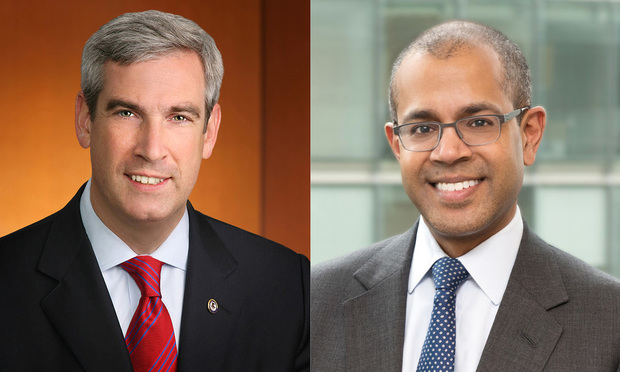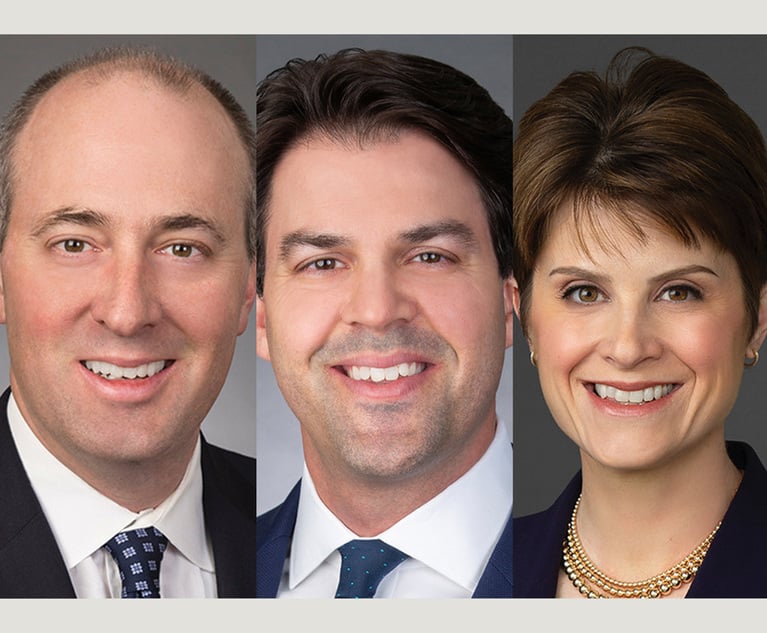Daily Dicta: Paul Weiss and Davis Polk Take the Cake for Exxon
The oil giant protested being slapped with a $2 million penalty for violating Ukraine-related sanctions regulations.
January 06, 2020 at 12:03 AM
3 minute read
 (L to R) Neil MacBride of Davis Polk & Wardwell and Kannon K. Shanmugam, Paul Weiss. (Photo: Courtesy Photo)
(L to R) Neil MacBride of Davis Polk & Wardwell and Kannon K. Shanmugam, Paul Weiss. (Photo: Courtesy Photo)
Talk about ending the year on a high note.
A team from Paul, Weiss, Rifkind, Wharton & Garrison led by Kannon Shanmugam along with Davis Polk & Wardwell litigators including Neil MacBride (the former U.S. Attorney for the Eastern District of Virginia), prevailed on behalf of ExxonMobil on the last day of 2019.
The oil giant protested being slapped with a $2 million penalty for violating Ukraine-related sanctions regulations.
Here's how U.S. District Judge Jane Boyle in Dallas teed up the question before her: "This is an administrative case prompting the court to determine which party receives the benefit of having its cake and eating it, too—the regulating agency that failed to clarify, or the regulated party that failed to ask."
 The cake went to Exxon. I'm visualizing it as chocolate.
The cake went to Exxon. I'm visualizing it as chocolate.
There was a bit of added drama. The lead lawyer for the government was Leslie Vigen—one of Shanmugam's former associates when he headed the appellate practice at Williams & Connolly. Alas, they didn't face off in court—Judge Boyle decided the case based on the written record.
Exxon successfully argued that the Office of Foreign Assets Control violated the Administrative Procedures Act on due process grounds when the government fined Exxon for doing business with Russian oil giant Rosneft.
The case dates back to 2014, when Russia annexed the Crimean peninsula. The Obama administration responded in part by naming "Specially Designated Nationals," whose property would be "blocked" based on their ties to the Russian government. One of them was Igor Sechin, the president and chairman of the management board of Rosneft.
At the time, the White House issued a fact sheet that stated, "Our current focus is to identify these individuals and target their personal assets, but not companies that they may manage on behalf of the Russian state." The defense dug up numerous other examples of the administration making similar statements.
So it's understandable why Exxon figured it could still do business with Rosneft, even though the company never actually asked OFAC for guidance.
(Which reminds of me of how my kids when doing something dubious would respond, 'But you never told me I couldn't.')
Exxon proceeded to execute eight contracts with Rosneft—all signed by Sechin. The feds cried foul, concluding that those contracts violated the sanctions.
But Boyle sided with Exxon in vacating the penalty, ruling that the government didn't give fair notice that the conduct was forbidden.
"Exxon's alleged violation is based on the receipt of a service, and the service was Sechin's act of signing. When does an entity 'take,' 'come into possession,' or 'get' a service? On this point, the regulations are silent," Boyle wrote.
"Exxon's decision to proceed with the contracts absent guidance from OFAC was risky—and perhaps imprudent," she continued. "But this factor does not overcome others suggesting a lack of fair notice."
This content has been archived. It is available through our partners, LexisNexis® and Bloomberg Law.
To view this content, please continue to their sites.
Not a Lexis Subscriber?
Subscribe Now
Not a Bloomberg Law Subscriber?
Subscribe Now
NOT FOR REPRINT
© 2025 ALM Global, LLC, All Rights Reserved. Request academic re-use from www.copyright.com. All other uses, submit a request to [email protected]. For more information visit Asset & Logo Licensing.
You Might Like
View All
Litigators of the Week: A $604.9M Trade Secrets Verdict With a Big Assist From a Juror Question

Litigators of the Week: A Reset in the Fight Over Nearly $2B in Bonds Issued by Venezuela's National Oil Company

How Kirkland & Ellis Litigators Became a National Brand in Oil and Gas

Dorsey & Whitney Hits Back Against Complaint Claiming Firm Dragged Its Feet on Malpractice Suit Against Fellow Big Firm
Law Firms Mentioned
Trending Stories
Who Got The Work
J. Brugh Lower of Gibbons has entered an appearance for industrial equipment supplier Devco Corporation in a pending trademark infringement lawsuit. The suit, accusing the defendant of selling knock-off Graco products, was filed Dec. 18 in New Jersey District Court by Rivkin Radler on behalf of Graco Inc. and Graco Minnesota. The case, assigned to U.S. District Judge Zahid N. Quraishi, is 3:24-cv-11294, Graco Inc. et al v. Devco Corporation.
Who Got The Work
Rebecca Maller-Stein and Kent A. Yalowitz of Arnold & Porter Kaye Scholer have entered their appearances for Hanaco Venture Capital and its executives, Lior Prosor and David Frankel, in a pending securities lawsuit. The action, filed on Dec. 24 in New York Southern District Court by Zell, Aron & Co. on behalf of Goldeneye Advisors, accuses the defendants of negligently and fraudulently managing the plaintiff's $1 million investment. The case, assigned to U.S. District Judge Vernon S. Broderick, is 1:24-cv-09918, Goldeneye Advisors, LLC v. Hanaco Venture Capital, Ltd. et al.
Who Got The Work
Attorneys from A&O Shearman has stepped in as defense counsel for Toronto-Dominion Bank and other defendants in a pending securities class action. The suit, filed Dec. 11 in New York Southern District Court by Bleichmar Fonti & Auld, accuses the defendants of concealing the bank's 'pervasive' deficiencies in regards to its compliance with the Bank Secrecy Act and the quality of its anti-money laundering controls. The case, assigned to U.S. District Judge Arun Subramanian, is 1:24-cv-09445, Gonzalez v. The Toronto-Dominion Bank et al.
Who Got The Work
Crown Castle International, a Pennsylvania company providing shared communications infrastructure, has turned to Luke D. Wolf of Gordon Rees Scully Mansukhani to fend off a pending breach-of-contract lawsuit. The court action, filed Nov. 25 in Michigan Eastern District Court by Hooper Hathaway PC on behalf of The Town Residences LLC, accuses Crown Castle of failing to transfer approximately $30,000 in utility payments from T-Mobile in breach of a roof-top lease and assignment agreement. The case, assigned to U.S. District Judge Susan K. Declercq, is 2:24-cv-13131, The Town Residences LLC v. T-Mobile US, Inc. et al.
Who Got The Work
Wilfred P. Coronato and Daniel M. Schwartz of McCarter & English have stepped in as defense counsel to Electrolux Home Products Inc. in a pending product liability lawsuit. The court action, filed Nov. 26 in New York Eastern District Court by Poulos Lopiccolo PC and Nagel Rice LLP on behalf of David Stern, alleges that the defendant's refrigerators’ drawers and shelving repeatedly break and fall apart within months after purchase. The case, assigned to U.S. District Judge Joan M. Azrack, is 2:24-cv-08204, Stern v. Electrolux Home Products, Inc.
Featured Firms
Law Offices of Gary Martin Hays & Associates, P.C.
(470) 294-1674
Law Offices of Mark E. Salomone
(857) 444-6468
Smith & Hassler
(713) 739-1250






